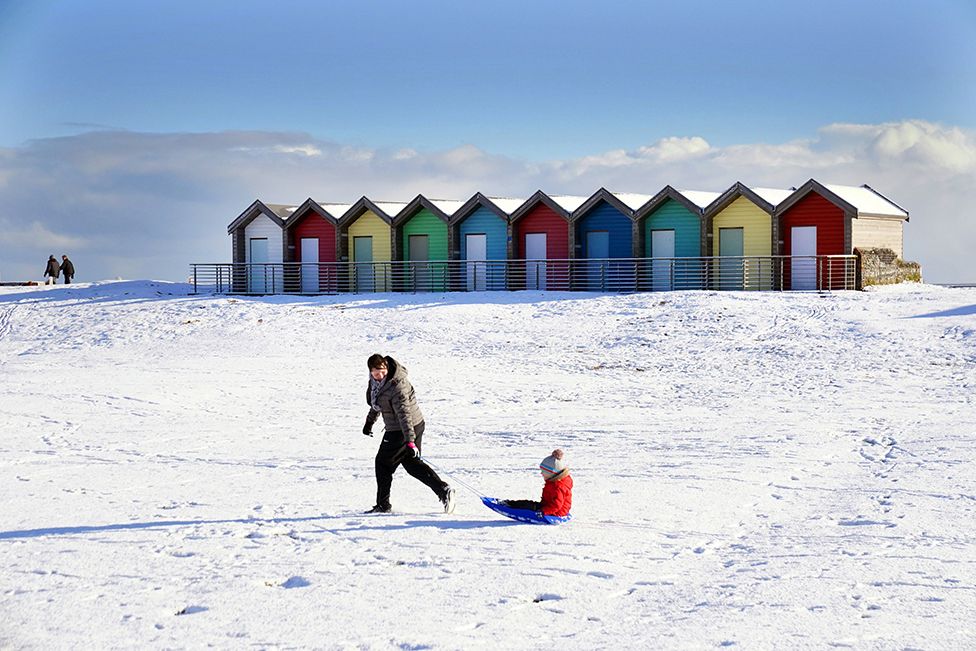In pictures: Snow blankets parts of the UK as cold snap starts
- Published

A cold snap from the Arctic has blanketed parts of the country in snow - and there's more to come.
Much of the UK is covered by snow and ice weather warnings on Tuesday night and into Wednesday morning.
Rain, wind and sleet are forecast to sweep in from the southwest and move east, with bitter conditions expected to persist until the weekend.
The worst of the weather will be largely confined to the south on Wednesday, but conditions are expected to worsen further north later in week.
Snow settled over northern Scotland, Northumberland and North Yorkshire on Tuesday, with as much as 10cm (3.9in) falling in northern Scotland.
BBC Weather's Jennifer Bartram says the cold snap is due to a change in wind direction "with northerly winds bringing cold air down from the Arctic".
The Met Office has warned traffic disruption and power cuts are likely across the country.
Tuesday could be the coldest night of the year so far, with temperatures expected to drop to -15C (5F) in some isolated Scottish glens.
People across southern England and south Wales are expected to wake up to snow on Wednesday, but the Met Office says it is unclear whether it will settle.
It says snow levels over the next few days will vary, but warns areas south of the M4 are at most risk of disruption.
Forecasters predict snow is more likely to settle as the cold weather moves across much of northern England, Northern Ireland and most of Scotland on Thursday.
Significant disruption is likely in places, the Met Office has warned, adding stronger winds could lead to blizzard conditions and drifting of snow.
Two old coal-fired power plants started generating power again on Tuesday to help get through the cold snap this week and prevent potential shortfalls.
The plants in West Burton in Lincolnshire were due to close last September, but the government requested they stay open for an extra six months amid fears of possible power shortages.
BBC forecaster Ms Bartram said that although it was not unusual to have snow and cold weather at the start of March, "this feels like a bit of a shock to the system after what was a mild and relatively dry February for most".
"Our main concerns over the next few days are the impacts of snow and ice, which is likely to cause disruption, such as travel delays and cancellations, stranded vehicles and power cuts", she added.
The current warnings in place are:
- A yellow warning for snow and ice is in place across north-east England, Scotland and parts of Northern Ireland on Wednesday until 10:00 GMT
- Across south England and south Wales there is a yellow snow and ice warning in place until 09:00 GMT on Wednesday and again overnight from Thursday into Friday
- A further yellow snow warning across much of the Midlands, northern England, north Wales, Scotland and Northern Ireland is in place on Thursday from 03:00 until 18:00 on Friday
Some ski resorts in Scotland have opened runs after the heavy snowfall, with Snowsport Scotland saying it hoped the recent weather would be "the start to another boost for the mountains".
"Looking at the forecast, this could be our biggest week of the year," said Alison Grove from Snowsport Scotland.
Altnaharra in the Scottish Highlands dropped to -7.6C (18F) overnight on Monday and the hamlet was covered in 12cm (4.7in) of snow - more snow than anywhere else in the UK.
In Scotland, dozens of schools have already been closed as heavy snow continues to cause disruption.
A level three cold alert has been issued by the UK Health Security Agency (UKHSA) for the whole of England, which is likely to be reviewed in coming days.
Dr Agostinho Sousa, the agency's head of extreme events and health protection, advised people to check on vulnerable relatives, adding that pensioners or anyone with an underlying health condition should heat their home to at least 18C (64F).
National Highways has issued a severe weather alert for snow in the south of England and urged people to consider if their journeys are necessary.
Scot Rail says it aims to run a full service this week, but has advised passengers to check their journeys as disruption is possible. National Rail has also warned snowy and icy conditions could affect south-eastern services over the next few days.